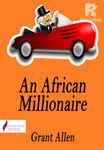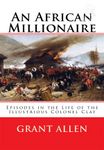25 books
-
1. 20 Must-Read Thriller Novels

A thriller novel is a novel that uses suspense, excitement, apprehension and exhilaration to tell a story. Thriller novels have villains, suspense, and action in settings such as espionage, medicine, crime, politics, and high tech. They often involve life and death situations and have high stakes, like the control of the world or the possibility of widespread death or destruction. Many times innocent people are victimized, stalked, or caught in situations that are beyond their control. Characters have to overcome obstacles, either alone or with a small group of people, and stop some catastrophe from happening. Thrillers usually have a happy ending. This book is a special collection of twenty best thriller novels which are going to embark you on a journey to the world of suspense, action, shock and fear. Here they are : BRAIN TWISTER by Randall Garrett DESPERATE REMEDIES by Thomas Hardy FOUR JUST MEN by Edgar Wallace GEEK MAFIA by Rick Dakan THE AFTER HOUSE by Mary Roberts Rinehart THE APARTMENT NEXT DOOR by William Andrew Johnston THE CZAR'S SPY by William Le Queux THE DUST OF DEATH: The Story of the Great Plague of the Twentieth Century by Fred Merrick White THE EVIL SHEPHERD by Edward Phillips Oppenheim THE INTERNATIONAL SPY by Allen Upward THE MAN WHO WAS THURSDAY: A NIGHTMARE by Gilbert Keith Chesterton THE MOST DANGEROUS GAME by Richard Connell THE PIT: A STORY OF CHICAGO by Frank Norris THE PRISONER OF ZENDA by Anthony Hope THE RIDDLE OF THE SANDS by Erskine Childers THE RIVER OF DEATH: A TALE OF LONDON IN PERIL by Fred Merrick White THE THIRTY-NINE STEPS by John Buchan THE THREE HOSTAGES by John Buchan THE WOMAN IN WHITE by Wilkie Collins WHAT'S BRED IN THE BONE by Grant Allen A well-formatted, easy-to-read book suitable for any e-reader, tablet or computer. The reader will go from one section to another one as quick as possible.
-
2. The Great Taboo
(1890) Preface: I desire to express my profound indebtedness, for the central mythological idea embodied in this tale, to Mr. J.G. Frazer's admirable and epoch-making work, "The Golden Bough," whose main contention I have endeavored incidentally to popularize in my present story. I wish also to express my obligations in other ways to Mr. Andrew Lang's "Myth, Ritual, and Religion," Mr. H.O. Forbes's "Naturalist's Wanderings," and Mr. Julian Thomas's "Cannibals and Convicts." If I have omitted to mention any other author to whom I may have owed incidental hints, it will be some consolation to me to reflect that I shall at least have afforded an opportunity for legitimate sport to the amateurs of the new and popular British pastime of badger-baiting or plagiary-hunting. It may also save critics some moments' search if I say at once that, after careful consideration, I have been unable to discover any moral whatsoever in this humble narrative. I venture to believe that in so enlightened an age the majority of my readers will never miss it.-- G.A., The Nook, Dorking, October, 1890.
-
3. An African Millionaire

An African Millionaire; Episodes in the Life of the Illustrious Colonel Clay by Charles Grant Blairfindie Allen. Charles Grant Blairfindie Allen (February 24, 1848 – October 25, 1899) was a Canadian science writer and novelist, educated in England. He was a public promoter of evolution in the second half of the nineteenth century.
-
5. Strange Stories
(1884) Preface: It is with some little trepidation that I venture to submit to the critical world this small collection of short stories. I feel that in doing so I owe some apology both to my readers and to the regular story-tellers. Being by trade a psychologist and scientific journeyman, I have been bold enough at times to stray surreptitiously and tentatively from my proper sphere into the flowery fields of pure fiction. Some of these my divarications from the strict path of sterner science, however, having been already publicly performed under the incognito of "J. Arbuthnot Wilson," have been so far condoned by generous and kindly critics that I am emboldened to present them to the judgment of readers under a more permanent form, and even to dispense with the convenient cloak of a pseudonym, under which one can always so easily cover one's hasty retreat from an untenable position. I can only hope that my confession will be accepted in partial extenuation of this culpable departure from the good old rule, "Ne sutor ultra crepidam;" and that older hands at the craft of story-telling will pardon an amateur novice his defective workmanship on the general plea of his humble demeanour. I may perhaps also venture to plead in self-defence that though these stories do not profess to be anything more than mere short sensational tales, I have yet endeavoured to give to most of them some slight tinge of scientific or psychological import and meaning. "The Reverend John Creedy," for example, is a study from within of a singular persistence of hereditary character, well known to all students of modern anthropological papers and reports. Members of barbarous or savage races, trained for a time in civilized habits, are liable at any moment to revert naturally to their primitive condition, especially under the contagious influence of companionship with persons of their own blood, and close subjection to the ancestral circumstances. The tale which I have based upon several such historical instances in real life endeavours briefly to hint at the modes of feeling likely to accompany such a relapse into barbarism in an essentially fine and sensitive savage nature. To most European readers, no doubt, such a sheer fall from the pinnacle of civilization to the nethermost abysses of savagery, would seem to call for the display of no other emotion than pure disgust and aversion; but those who know intimately the whole gamut of the intensely impressionable African mind will be able to treat its temptations and its tendencies far more sympathetically. In "The Curate of Churnside," again, I have tried to present a psychical analysis of a temperament not uncommon among the cultured class of the Italian Renaissance, and less rare than many people will be inclined to imagine among the colder type of our own emancipated and cultivated classes. The union of high intellectual and sthetic culture with a total want of moral sensibility is a recognized fact in many periods of history, though our own age is singularly loth to admit of its possibility in its own contemporaries. In "Ram Das of Cawnpore," once more, I have attempted to depict a few circumstances of the Indian Mutiny as they must naturally have presented themselves to the mind and feelings of a humble native actor in that great and terrible drama. Accustomed ourselves to looking always at the massacres and reprisals of the Mutiny from a purely English point of view, we are liable to forget that every act of the mutineers and their aiders or abettors must have been fully justified in their own eyes, at the moment at least, as every act of every human being always is to his own inner personality. In his conscience of conscience, no man ever really believes that under given circumstances he could conceivably have acted otherwise than he actually did. If he persuades himself that he does really so believe, then he shows himself at once to be a very poor introspective psychologist. "The Child of the Phalanstery," to take another case, is a more ideal effort to realize the moral conceptions of a community brought up under a social and ethical environment utterly different from that by which we ourselves are now surrounded. In like manner, almost all the stories (except the lightest among them) have their germ or prime motive in some scientific or quasi-scientific idea; and this narrow sss which thus connects them at bottom with my more habitual sphere of work must serve as my excuse to the regular story-tellers for an otherwise unwarrantable intrusion upon their private preserves. I trust they will forgive me on this plea for my trespass on their legitimate domains, and allow me to occupy in peace a little adjacent corner of unclaimed territory, which lies so temptingly close beside my own small original freehold. I should add that "The Reverend John Creedy," "The Curate of Churnside," "Dr. Greatrex's Engagement," and "The Backslider," have already appeared in the Cornhill Magazine; while "The Foundering of the Fortuna" was first published in Longman's Magazine. The remainder of the tales comprised in this volume have seen the light originally in the pages of Belgravia. I have to thank the courtesy of the publishers and editors of those periodicals for kind permission to reprint them here. Grant Allen, The Nook, Dorking, October 12, 1884.
-
7. The Woman Who Did
(1895) To My Dear Wife, To Whom I Have Dedicated My Twenty Happiest Years, I Dedicated Also, This Brief Memorial Of A Less Fortunate Love Written at Perugia, Spring 1893. For the first time in my life, wholly and solely to satisfy my own taste and my own conscience. Preface: "But surely no woman would ever dare to do so," said my friend. "I knew a woman who did," said I; "and this is her story." This controversial novel is about a young, self-assured middle-class woman who defies convention as a matter of principle and who is fully prepared to suffer the consequences of her actions. It was adapted into a British silent film directed by Walter West in 1915, and in Germany in 1925.
-
8. Science in Arcady
(1892) Dedicated To Grant Richards, In Grateful Acknowledgement of Many Kind Offices, Avuncular Greeting. PREFACE: These essays deal for the most part with Science in Arcady. 'Tis my native country: for I am not of those who 'praise the busy town.' On the contrary, in the words of the great poet who has just departed to join Milton and Shelley in a place of high collateral glory, I 'love to rail against it still,' with a naturalist's bitterness. For the town is always dead and lifeless. There are who admire it, they say--poor purblind creatures--because, forsooth, 'there is so much life there.' So much life, indeed! No grass in the streets; no flowers in the lanes; no beetles or butterflies on the dull stone pavements! Brick and mortar have killed out all life over square miles of Middlesex. For myself, I love better the densely-peopled fields than this human desert, this beflagged and macadamised man-made solitude. The country teems with life on every hand; a thousand different plants and flowers in the spangled meadows; a thousand varied denizens of pond, and air, and heath, and copses. Their ways are endless. They attract me far more with their infinite diversity than the grey and gloomy haunts of the cab-horse and the stock-broker. But my Arcady, as you will see, is none the less tolerably broad and eclectic in its limits. These various essays have been suggested to my pen by rambles far and wide between its elastic confines. The little tractate on Mud, for example, recalls to mind some pleasant weeks among the Italian lakes and on the plain of Lombardy. A Desert Fruit owes its origin to a morning at Luxor. High Life had its key-note struck by a fortnight in the Tyrol. Tropical Education is a dim reminiscence of old Jamaican experiences. Our Eight-Legged Friends were observed at leisure on the window-panes of our own little nook at Dorking. A Hill-Top Stronghold was sketched in situ at Florence by a window that looked across the valley to Fiesole. Excursions into books or into the remoter past have given occasion for the arch ological essays relegated here to the end of the volume. My thanks are due to Messrs. Longmans for permission to reprint from their magazine My Islands, A Hill-Top Stronghold, A Desert Fruit, The Isle of Ruim, Eight-Legged Friends, and Tropical Education. I have also to acknowledge a similar courtesy on the part of Messrs. Smith & Elder with regard to Mud, The Bronze Axe, High Life, Pretty Poll, The Greenwood Tree, On the Wings of the Wind, Casters and Chesters, and Fish as Fathers, all of which originally appeared in the Cornhill. Messrs. Chatto & Windus have been equally kind as regards the paper on An English Shire contributed to the Gentleman's. A Persistent Nationality made its first bow in the North American Review, and has still to be introduced to an English audience. G.A. Hind Head, Surrey, Oct., 1892.
-
11. Falling in Love
With Other Essays On More Exact Branches of Science (1889) PREFACE: Some people complain that science is dry. That is, of course, a matter of taste. For my own part, I like my science and my champagne as dry as I can get them. But the public thinks otherwise. So I have ventured to sweeten accompanying samples as far as possible to suit the demand, and trust they will meet with the approbation of consumers. Of the specimens here selected for exhibition, my title piece originally appeared in the Fortnightly Review: 'Honey Dew' and 'The First Potter' were contributions to Longman's Magazine: and all the rest found friendly shelter between the familiar yellow covers of the good old Cornhill. My thanks are due to the proprietors and editors of those various periodicals for kind permission to reproduce them here. G.A. THE NOOK, DORKING: September, 1889.
-
17. Hilda Wade
A Woman With Tenacity Of Purpose. (1899) After Grant Allen's death in 1899, he left the unfinished manuscript for this novel, featuring detective Hilda Wade. It was written to completion by his friend and neighbour Sir Arthur Conan Doyle. NOTE: In putting before the public the last work by Mr. Grant Allen, the publishers desire to express their deep regret at the author's unexpected and lamented death--a regret in which they are sure to be joined by the many thousand readers whom he did so much to entertain. A man of curiously varied and comprehensive knowledge, and with the most charming personality; a writer who, treating of a wide variety of subjects, touched nothing which he did not make distinctive, he filled a place which no man living can exactly occupy. The last chapter of this volume had been roughly sketched by Mr. Allen before his final illness, and his anxiety, when debarred from work, to see it finished, was relieved by the considerate kindness of his friend and neighbour, Dr. Conan Doyle, who, hearing of his trouble, talked it over with him, gathered his ideas, and finally wrote it out for him in the form in which it now appears--a beautiful and pathetic act of friendship which it is a pleasure to record.
-
19. Anglo-Saxon Britain
(1881) From the Preface: This little book is an attempt to give a brief sketch of Britain under the early English conquerors, rather from the social than from the political point of view. For that purpose not much has been said about the doings of kings and statesmen; but attention has been mainly directed towards the less obvious evidence afforded us by existing monuments as to the life and mode of thought of the people themselves. The principal object throughout has been to estimate the importance of those elements in modern British life which are chiefly due to purely English or Low-Dutch influences.
-
20. Post-Prandial Philosophy
(1894) Preface: These Essays appeared originally in The Westminster Gazette, and have only been so far modified here as is necessary for purposes of volume publication. They aim at being suggestive rather than exhaustive: I shall be satisfied if I have provoked thought without following out each train to a logical conclusion. Most of the Essays are just what they pretend to be -- crystallisations into writing of ideas suggested in familiar conversation. G. A., Hind Head, March 1894.
